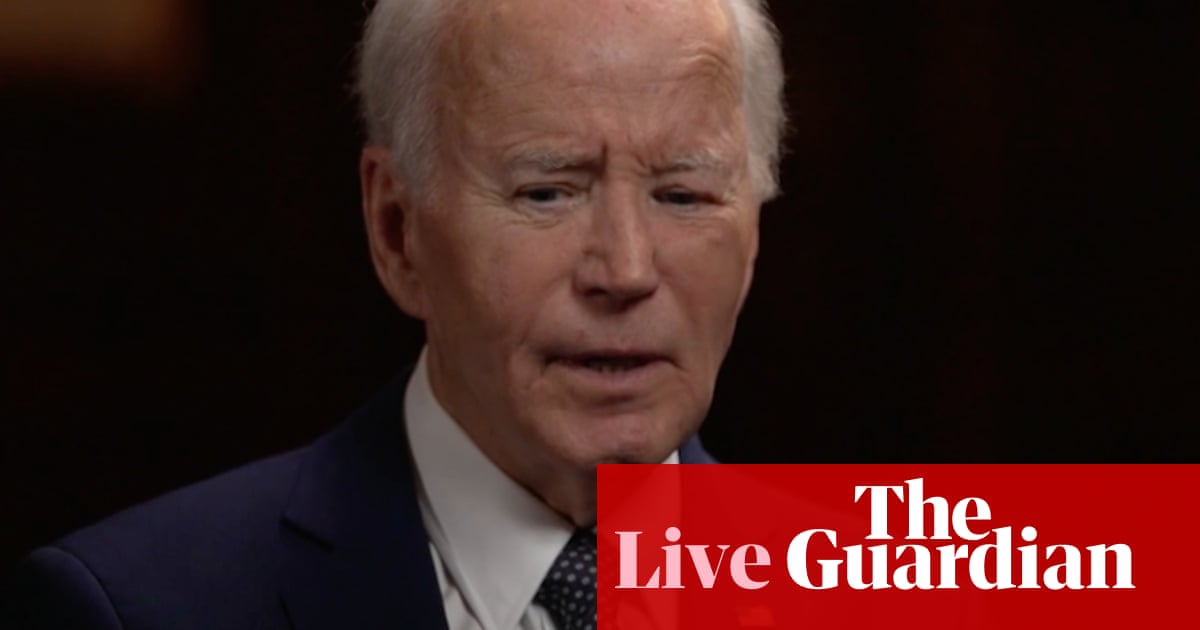Joe Biden has accused Donald Trump of “modern-day appeasement” in his approach to Russia and expressed fears that Europe would “lose confidence in the certainty of America” in his first interviewsince leaving the White House in January.
“He [Vladimir Putin] believes it [Russia] has historical rights to Ukraine,”Bidentold the BBC. Anybody who thought the Russian president would stop if Kyiv conceded territory,as recently proposed by Trump, “is just foolish”, he said.
Speaking in Delaware as the Allied nations mark the 80th anniversary of the end of the second world war, Biden said Trump’s stance was “modern-day appeasement” in reference to the attempts of British prime minister Neville Chamberlain’s to appease Adolf Hitler in the 1930s.
He also said he fearedEuropewas going to lose confidence in the “certainty of America and the leadership of America” and that a breakdown of US-Europe relations under Trump “would change the modern history of the world”.
Biden said the leaders of European nations would be left “wondering, well, what do I do now? … Can I rely on the United States? Are they going to be there?
“I fear our allies around the world are going to begin to doubt whether we’re going to stay where we’ve always been in the last 80 years,” he said.
Biden told Nick Robinson that he found theextraordinary meetingin the Oval Office between Trump and Ukraine’s president Volodymyr Zelenskyy “beneath America”.
He went on to condemn Trump’s calls for the US totake back the Panama canal,make Canada the 51st American stateandseize Greenland.
Hello and welcome to theUS politicslive blog. I’m Tom Ambrose and I will be bringing you the latest news lines over the next hour or so.
Firstly,Donald Trumpsaid he “just want[s] to be friends withCanada” after his first post-election meeting with the country’s prime minister,Mark Carney– who used the gathering to shoot down any prospect of his country becoming the 51st state.
Speaking in the Oval Office, Trump praised Carney – whose Liberal party won the federal election last week – for one of the “greatest political comebacks of all time”, and described the prime minister’s visit as “an honour” for the White House.
The amicable tone of Tuesday’s meeting marked a stark contrast with Trump’s hostile rhetoric over recent months, as he launched a trade war against his northern neighbour, belittled Carney’s predecessor,Justin Trudeau, and made repeated threats to crush Canada’s economy with the aim of annexing it.
Carney returned the praise, telling Trump he was a “transformational president” with a strong focus on the economy. But he shot down any idea thatCanadamight accede to joining the US as the 51st state – a proposal again floated by Trump in the meeting.
“As you know from real estate, there are some places that are never for sale,” Carney told Trump.
“That’s true,” said Trump.
“Having met with the owners of Canada over the course of the campaign … it’s not for sale,” said Carney. “Won’t be for sale, ever.”
“Never say never,” said Trump. Carney smiled and mouthed “never, never, never, never.”
For the full report on the meeting and further reaction, see here:
In other news:
US treasury secretary Scott Bessent and US trade representative Jamieson Greer will meet with their Chinese counterparts later this week in Switzerland, in what could be the first step to negotiating an end to the trade war between the world’s two largest economies over tariffs imposed by Trump.
Bessent also contradicted a previous claim from Trump that talks with China had been going on for weeks. “We haven’t had negotiations,” Bessent told Fox. “The world has been coming to the US, and China has been the missing piece.”
Trump revealed to reporters that three more Israeli hostages have died in Gaza, meaning that just 21 of the hostages taken from Israel on 7 October 2023 remain alive. “I say 21, because, as of today, it’s 21. Three have died,” the president said.
At the White House event on the 2026 World Cup, Trump learned from a reporter that Russia is banned from taking part, as a result of its invasion of Ukraine.
Columbia Universityannouncedthat it laid off nearly 180 researchers in response to the Trump’s administration’s decision to cancel $400m in funding over the Ivy League school’s handling of student protests against the war in Gaza.
The Trump administration may deport migrants to Libya for the first time this week, three US officialstell Reuters.
